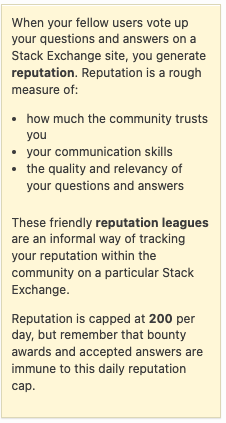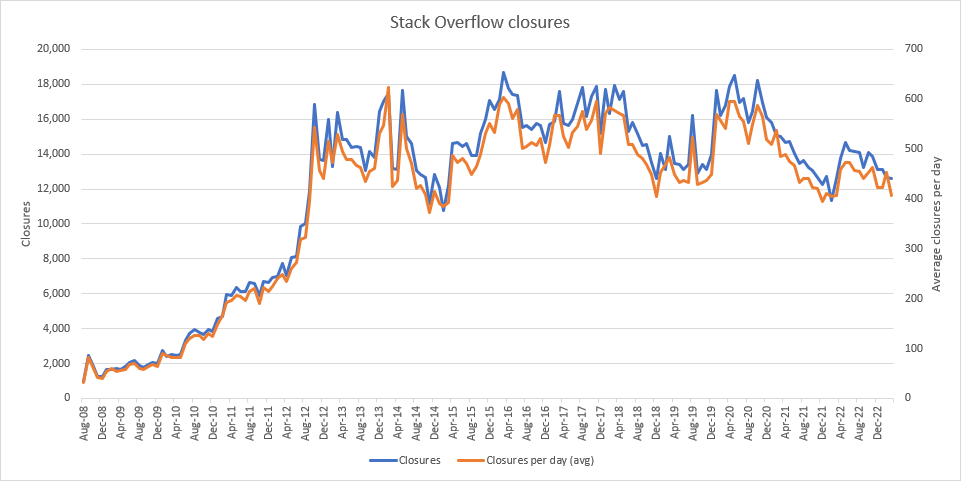TL;DR:
In general, the reputation system might be doing a good work as the large user base is using the system properly and most of those having a high reputation have fairly earned it. Unfortunately, there are a few that are taking advantage of some system cracks, like neglected tags or some sites with low participation or have found how to game the system.
The reputation system might be benefit from being analysed by using a systems approach, i.e., by using a framework / model like Viable System Model (VSM).
Suggestions:
Improve the contingency / correction measures to better palliate the perverse incentive effects, better help to avoid game the system, and avoid usage vices.
Add more visibility to helpful information for the user and community explicitly pointed to facilitate and require a standard (minimal) self-regulation / self-organization.
Better align the reputation system to the welcoming, helping goals, participation and community health goals.
Using the VSM, the reputation system might be seen as a concrete component that interacts with several conceptual systems of this recursive analysis model.
In VSM, the "system 1" refers to autonomous recursive components. In the case of the Stack Exchange (SE) Network, each user could be seen as a system 1 who is part of a community that also could be seen as a system 1. Each community is part of the SE network, and that could be seen as the system 1 in focus.
The core concept of the reputation system is that reputation points are earned by each SE user as the result of their interactions with other SE users through the SE software. Unfortunately, many users and apparently many communities too, don't look to have the requisite variety to achieve the autoregulation "standards". In other words, the environment and the tasks to be done are too complex in relation to capacity installed understood as the skills, knowledge, being able to participate, willing to participate.
On the other hand, there is also an alignment problem as not all users are willing to participate according to the goals and policies, but they still found ways to earn reputation. Sometimes this is referred to as "game the system".
When a user is suspended, their reputation is temporarily set to 1, but once the suspension finish the reputation is restored completely. The suspension records aren't public.
There are automatic and manual applied bans to restrict specific privileges. The ban records aren't public.
The access to higher privileges is merely based on reputation points, and it doesn't consider suspensions and bans.
There are some pages that show aggregated data about users, i.e., new users, editors, voters, and moderators, and there are leaderboards, but there isn't any clear guidance, and apparently there is a lack of management knowledge and skills (requisite variety), i.e., about how can users as individuals and as community might use the reputation system to take control and policy decisions as individual (self management) and as community (self organization).
Reputation system points
IMO, ideally the reputation system, besides tracking the current points, might do a better representation of trustiness than nowadays do, if it also tracks an indicator about give the community parameter about how the user behavior is aligned to the community values, let’s call it the "karma" indicator. The karma indicator might be calculated based on user participation in tasks that doesn't give reputation points, but contributes to the community like comments, votes, etc. will make earn karma, by the other hand getting spam flags, abuse flags, suspensions, that some way go against the community will make that the user loose karma.
The karma points might be used for instead of the reputation privileges, i.e., to participate in the per-site meta and in the a site chatroom for new users. Also at a certain level it might earn some "one-day pass" that can be given to new users to allow them participate in the per-site meta and in a site chatroom for helping new users to learn the ropes of the site.
Exceptions
Flag for Moderator Attention and CM escalation process
The automatic algedonic (pleasure and pain) channel is responsible of handling the notifications about the good and bad expections. The reputation system triggers inbox notifications or emails about achieving milestones that are related to earning a priveling or badge.
The replies to flags and suspensions are other notifitications of the overall system that should be more clearly related to the reputation system. At this time only the user and the moderators of the correspondig sites might see them in the user profile but they aren't not clearly linked to the reputation system. The closer might be user community moderator process that have a nominee score card showing some metrics and that might block the participation of users for having suspensions.
The reputation systems doesn't have warnings levels and there are important things that are not throwing notifications that help / guide users and communities to better self regulate / organize.
Incentives
After the site graduation process, the reputation system doesn't track / recognize commitment.
The reputation system incentives to interact with the users from other communities and with the environment are minimal. I think that the only incentive in the reputation system are badges earned for views through shared links.
The reputation system incentives have shown causing undesired effects. Probably it might be qualified as perverse incentive system as in a certain grade, it has caused problems like:
- very low quality posts being answered and upvoted instead of being downvoted, closed and deleted when they aren't improved,
- "fastest gun in the west" (be the first to answer to take advantage of the chronological sorting, being seen first),
- "tactical voting" (to make a post to have a better ranking to another for other reasons than the post content)
- "balance voting" (to compensate an "unfair" vote)
- "welcome voting" (to allow the user to post in the per-site meta and or use the chat)...
Vices
Sometimes good-intentioned users take advantage of the flexibility of the system to deviate its usage in order to help a user that "deserve it". The recurrence of this might relax the attention and eventually that might opened opportunities for gaming the system.
Meta System Relative to the whole SE Network
The reputation system aggregates reputation across all the sites only in the chat and in combined-flairs.
https://stackexchange.com/leagues shows the leaderboard for each site showing only the reputation points.
|
|
 |
When your fellow users vote up your
questions and answers on a Stack
Exchange site, you generate
reputation. Reputation is a rough
measure of: - how much the community trusts
you - your communication skills
- the quality and relevancy of your
questions and answers
These friendly reputation leagues
are an informal way of tracking your
reputation within the community on a
particular Stack Exchange. Reputation is capped at 200 per day,
but remember that bounty awards and
accepted answers are immune to this
daily reputation cap. |
It might be helpful that also shows a leaderboard of participation (comments, votes, reviews, participation in per-site meta, participation in the site main chatroom)
Network Wide Policies
All users starts in Meta Stack Exchange with reputation 1 or with the association bonus. That might be fine for certain type of posts, but for posts discussing stuff that might affect all the network it might be convenient to have a better idea of the contribution done across the network without having to individually navigate to the network profile of each user.
Thinking loudly, posts with discussion might show the regular user card (reputation earned in Meta SE only). On posts with feature-request might be shown a user card similar to combined-flair showing the total network earned reputation and a selection of the sites where the user have being participating recently more frequently.
Related answers
Perverse incentives
Karma


